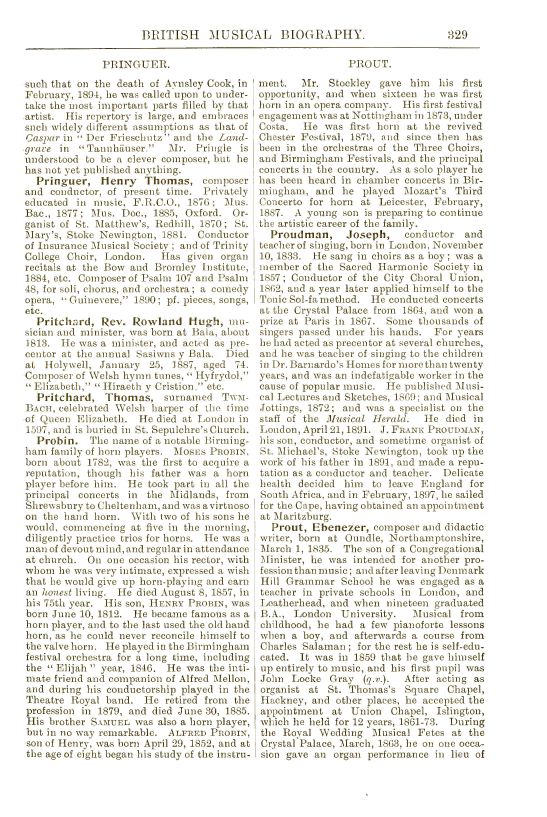- Prout, Ebenezer
[E] Prout, Ebenezer, composer and didactic
writer, born at Oundle, Northamptonshire,
March 1, 1835. The son of a Congregational
Minister, he was intended for another pro-
fession thanmusic ; and after leaving Denmark
Hill Grammar School he was engaged as a
teacher in private schools in London, and
Leatherhead, and when nineteen graduated
B.A., London University. Musical from
childhood, he had a few pianoforte lessons
when a boy, and afterwards a course from
Charles Salaman ; for the rest he is self-edu-
cated. It was in 1859 that he gave himself
up entirely to music, and his first pupil was
John Locke Gray {q.v-)- After acting as
organist at St. Thomas's Square Chapel,
Hackney, and other places, he accepted the
appointment at Union Chapel, Islington,
which he held for 12 years, 1861-73. During
the Royal Wedding Musical Fetes at the
Crystal Palace, March, 1863, he on one occa-
sion gave an organ performance in lieu of[+] James Coward. In 1861 he was appointed a
professor of the pf. at the Crystal Palace
School of Art, resigning in 1885 ; professor of
harmony and composition at the National
Training School for Music from its opening
in 1876 ; succeeded to Sir Arthur Sullivan's
class at R. A.M., 1879; and in 1881 professor
of pf. at Guildhall School of Music. Conduc-
tor of Hackney Choral Association, 1876-90,
during which time a high reputation was
gained by the Society, and many important
works produced, some for the first time in
England. As a composer he was brought into
notice by gaining the first prize of the Society
of British Musicians in 1862, and again in
1865 ; and the performance of his first Organ
Concerto by (Sir) John Stainer at the Crystal
Palace, 1872, increased his reputation. His
literary career has been equally striking. He
was editor of the A/ontliiy Musical Record,
1871-4 ; musical critic of the Academy, 1874-9 ;
and of the AthencBum, 1879-89. On retiring
from the last, he devoted himself to writing
those educational works which will rank
among the most masterly and comprehensive
examples English musical literature can boast
of. He has lectured in London and the
provinces; contributed valuable papers to the
Musical Association, the Conferences of the
Incorporated Society of Musicians, Grove's
Dictionary of Music, Monthly Musical Record,
etc. ; and has conducted performances of his
works at the Crystal Palace, Birmingham and
Bristol Festivals, and elsewhere. In 1894 he
was elected Professor of Music in Dublin
University, the degree of Mus. Doc, lionoris
causa, being conferred upon him at the
beginning of 1895, and later in the same year
he was honoured by being the first to receive
the degree of Mus. Doc. from the University
of Edinbui'gh.[W] Works. — Choral : Magnificat in C, op. 7,
for soli, chorus, and orchestra, composed 1873,
produced. Crystal Palace, January 15, 1876 ;
Chorus, Hail to the Chief, op. 10, composed
for re-opening of Alexandra Pabice, 1877 ;
Cantata, Hereward, op. 12, Hackney Choral
Association, 1878 ; Cantata, Alfred, op. 16,
the same. May 1, 1882 ; Ode, Freedom, op. 20,
the same, April 20, 1885 ; Psalm 100, op. 2.3,
for soprano solo, chorus, and orchestra, 1886;
Red Cross Knight, Cantata, op. 24, composed
for 'he Jubilee of the Huddersfield Choral
Society, jsroduced October 7, 1887 ; Damon
and Phintias (male voices), op. 25, Oxford,
May 31, 1889; Queen Aimee (female voices),
op. 21, 1885 ; Psalm 126, for soli, chorus, and
orchestra, St. Paul's Cathedral, May 28. 1891 ;
Church services and anthems, We give Thee
thanks (8 voices), and others. Sccna, con-
tralto voice and orchestra, Norwich, 1887.
Orchestral : Symphony No. 1, in C, Crystal
Palace, February 28, 1874 ; No. 2, in G minor,
the same, December, 1877 ; No. 3, in F, op.
23, Birmingliam Festival, 1885 ; No. 4, in D,
Oxford, June, 1886; Minuet and Trio, St.
James's Hall, March 5, 1878. Overtures :
Twelfth Night, Bristol, February 14, 1881 ;
Rokeby, Crystal Palace, March 23, 1889 ;.
Suite de Ballet, op. 28, 1891. Organ Concerto
in E minor, Crystal Palace (Stainer), October
19, 1872 ; in E fiat, Bristol (Riseley), April 6,
1885. Quartets: Op. 1, strings (prize), 1862;.
Op. 3, pf. and strings (prize), 1865 ; Op. 15, in
B flat, strings; Op. 18, in F, pf. and strings.
Q lintet, Op. 3, pf. and strings. Sonata in
D, op. 26, pf. and clarinet ; Sonata, op. 4,.
organ ; Duo Concertante, op. 6, pf. and har-
monium. Organ arrangements, 44 Nos.
Pf. iDieces. Editor, with J. Curwen, of the
Harmonium and Organ Book. Author of a
primer on Instrumentation, Novello, 1876 ;
Harmony, its Theoi-y and Practice (with key,
additional exercises and key) nine editions to
1896 ; Counterpoint, Strict and Free (with
additional exercises), 5 editions ; Double
CounterjDoint and Canon, 2 editions; Fugue,
3 editions ; Fugal Analysis, 2 editions ;
Musical Form, 2 editions ; and Applied
Forms, 2 editions, all published by Augener.
It is understood that Professor Prout has two
comic operas in MS. His son, Louis Beet-
hoven Prout, born in London, September
14, 1864, is a pianist and teacher. In 1888
he was appointed professor of harmony at the
Crystal Palace School. He has set Psalm 9.3'
for voices and organ, and is author of a work
on Harmonic Analysis, London, Augener,
and a pamphlet. Time, Rhythm, and Expres-
sion, London, Cocks.entry id: 329-R-42

page 329 - view at internet archive
